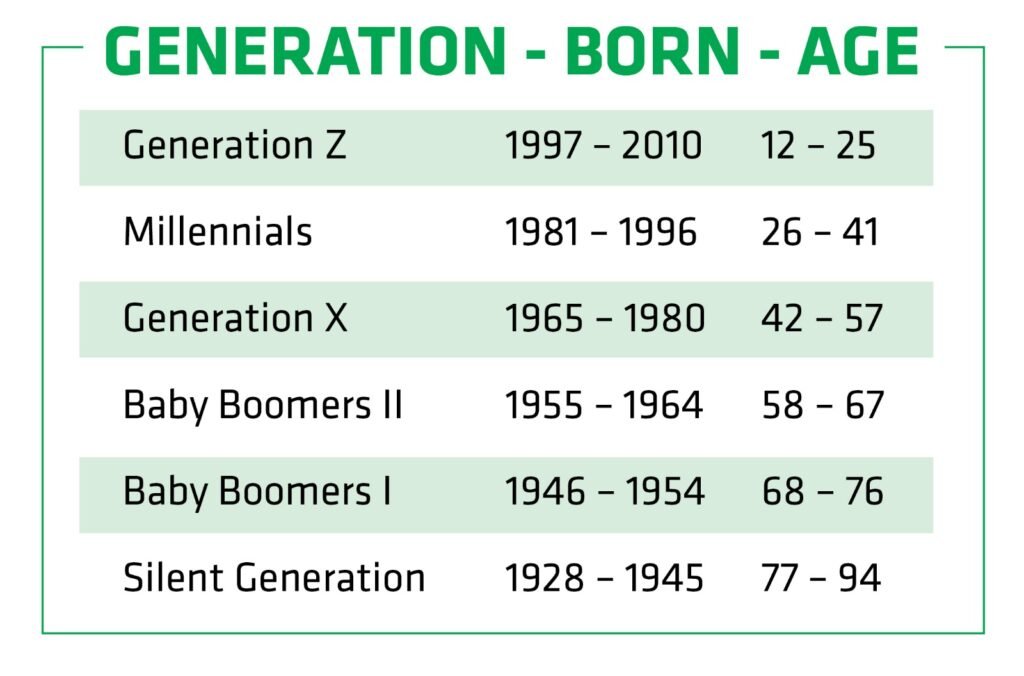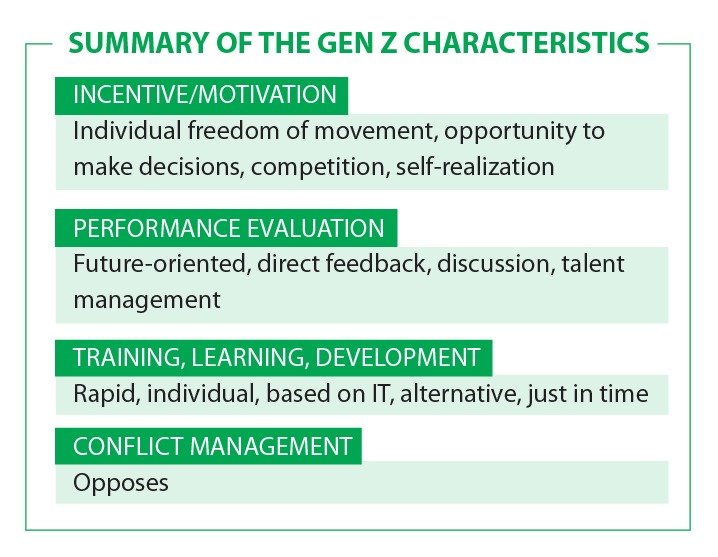The generation Z, consisting of people aged between 12 and 25, is the most populous and diverse generation in history. For their age and population numbers, it is undeniable to say that this generation will be taking charge of most of the workplace duties in 2025. The inclusion of this generation in the workplace has transformed communication as well as other policies in organisations.
Building a bridge between the old social culture and the new technology-based knowledge is the most important thing this generation is going to bring to the workplace, as they are hugely capable of using technologies. Taking this in mind, companies with innovative approaches are recognising this generation, known simply as “Gen-Z,” as the path-breaker in moving towards the future.
Who are these Gen Z and what are they bringing?
Gen-Z, or Generation Z,” is the generation of people who were born between 1997 and 2012. These people, aged between 12 and 25, currently consists 25% of the world’s total population. As employers want to persuade the people to become compact with IT-based knowledge, that’s why these people are in great demand for the workplaces in order to bring the change that organisations are wanting for.

There are many thoughts that this generation will become risk-averse and pragmatic, as they grew up after the great recessionary period and didn’t confront any severe battles. But proving them wrong, this generation is showing their worth in every sector, from gaining knowledge to taking risks. Their working styles, career development goals, core values, education, character, and diverse nature and behaviour have long attracted the interest of business leaders.
Research reveals, “The motivating factors for Gen Z employees differ from those of previous generations. While Millennials were primarily motivated by monetary rewards, Gen Z employees value non-monetary incentives such as growth opportunities and career advancement. According to research conducted by the Millennial Branding website, only 28% of Gen Z employees rate money as their most important reward, compared to 38% who prioritize job growth prospects.”
When it comes to communication, Gen Z prefers open and honest communication with everyone, regardless of their position or status. They are used to having access to information at lightning speed (Tapscott, 2010). They value their freedom and are more likely to pursue careers that offer flexibility and the ability to work remotely.
How they are affecting surroundings?
According to research, the preferences of Generation Z (GEN Z) are expected to play a significant role in workplace interactions and work relationships. One of the key expectations of GEN Z is to have close relationships with their supervisors and receive frequent feedback. They also value open communication from their supervisors and mentors, even on matters that are usually reserved for more senior employees. Additionally, GEN Z prefers to work in smaller teams because they perceive group-based work to be more enjoyable.
The concept of a lack of practical experience is a common theme among young professionals. Many of them feel that “they are in lack of essential soft skills, like the ability to control anxieties, engaging in teams, public speaking and exposure, express themselves in logical manner and coherently, social skills, a global perspective, preparing for job interviews, and how to market themselves efficiently,” said two researchers Hlavatý and Dömeová. Although they have learned a great deal of theoretical knowledge, they lack practical skills such as organizing tasks, problem-solving, and data analysis.
Furthermore, Bucharest Academy of Economic Studies researcher Maria-Cristina Iorgulescu said, “Gen Z students prefer practical teaching approaches and are interested in converting theoretical knowledge into practical skills.” They also have serious expectations about how to save the world and are more environmentally conscious and responsible than previous generations (White, 2014). They are more likely to be reliable and serious customers who place a high value on transparency and ethical business practices.
Gen Z employees are motivated by openness, autonomy, flexibility, and self-determination, and neglecting these factors can result in negative consequences. It is important for organizations to recognise these preferences and create a workplace culture that fosters creativity and encourages employees to feel valued and trusted.
Gen Z feels comfortable working in a condition where their work will be viewed in a worthy light and their efforts will be valued for making them better global citizens. Companies working for the sake of increasing sustainability, meeting the policies for mitigating the adverse effects of climate change, eradicating hunger, in short, the companies that are showing their class in working with maintaining proper corporate social responsibility have a better chance of attracting this generation.
How will they make an impact?
According to several reports, Gen Z will take over 27% of the workforce duties in the countries of the Organization for Economic Co-operation and Development (OECD) by 2025. At this time, the generation will consist of one-third of the total world’s population too. As this generation is entering the workplace at a time of impending and gradual increases in inflation, economic instability, looming recession, and housing crisis, as well as in a condition where the world is trembling with traumatic events like war, political unrest, and violence, this Gen Z has been shaped to have a unique set of abilities in maintaining all of these at a time, incorporating their IT knowledge too.

Due to the rise of tensions worldwide in economic, political, diplomatic, and ethical positions, Gen Z had to deal with numerous problems in the phase of their becoming adults. For which, they became able to shape their nature and behaviour with a fast-coping mentality as well as with the critical thinking ability. This generation can at the same time face immense challenges and work under pressure as well. However, according to research, excessive levels of stress and anxiety harm Gen Z employees disproportionately. When surveyed, it was found that about 45% of people of this generation deal with excessive stress and anxiety most of the time, and women are more likely to face these tensions than men.
Gen Z prioritises flexible working conditions and shared values with increased psychological support. This generation usually wants to opt for greater duties and work with those with enough opportunity and freedom. According to a Bank report, about 25% of the population of Gen Z has switched jobs in the past six months, and the number is still increasing every day. This shifting tendency is happening because this generation seeks to work with freedom and responsibility with greater opportunity. They want to take risks, and deal with those. So, if they think an organisation is not providing them with these opportunities, then they are finding the next one and trying to cope there.
But the most important factor here is that the generation Z works for any organisation with the aim of making their mark there. They don’t like to just do the task and count payments at the end of the month. Rather, their goal lays a line upper, as they want to gain much and want to hear the sounds of their achievements louder in the organisation.
Group Head of Talent at Zurich Insurance Group Sally Henderson said in a report, “we are already experiencing the positive impact of Gen Zs in our workplaces. They are crucial to us because they are the future of our company,, our economy, our country, and the world. But to cope with them, all you need to do is understand their needs and meet their expectations. And we should keep in mind that there is a huge difference between our generation’s expectations and theirs. If one can provide this generation with purposeful experience and a prosperous future career, then he surely can attract this amazing talent under his supervision.”
What’s the difference between Gen Z and other generations?
Known as first global generation, Gen Z has grown up in a society full of global contents and information that are freely available.
With higher knowledge, Gen Z poses a broad range of capabilities in meeting challenges and taking risks openly. But there are some problems too. One of those is “coping out.” According to a survey of U.S. students, Gen Z has the tendency to change jobs up to 10 times between the ages of 18 and 34. Another study showed that, about 42% of Gen Z employees give increased value to work-life balances. They prioritise flexibility and remote working in their professional careers when looking for work.
Moreover, this generation values jobs where they can expand their skills and apply their capabilities to gain something better both for the organisation and themselves.


